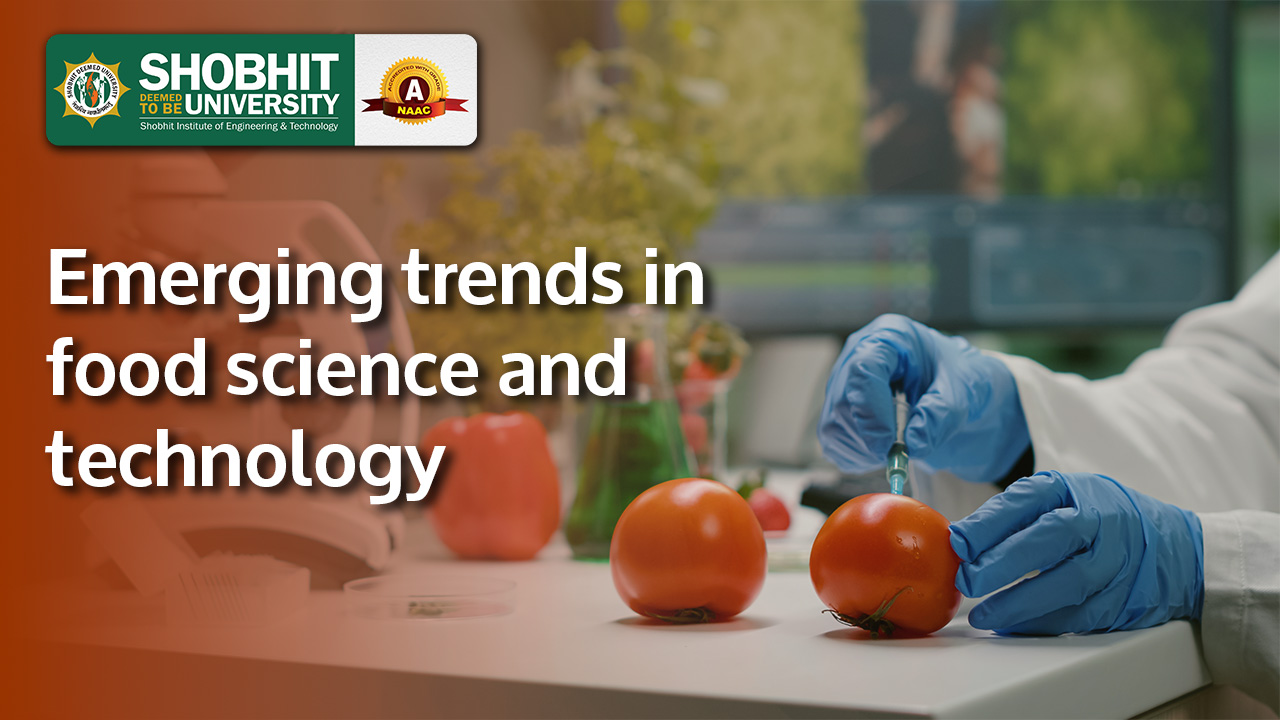
Emerging Trends in Food Science and Technology: Shaping the Future of What We Eat
Food has always been central to our lives—but in today's world, how food is grown, processed, packaged, and consumed is rapidly changing. Driven by technology, health concerns, sustainability goals, and consumer demand, food science and technology is evolving in exciting ways.
Let’s explore some of the emerging trends transforming our food systems, and how these shifts are opening new career opportunities for students, researchers, and food professionals.
1. Clean Label and Plant-Based Foods
Consumers today want to eat healthier and closer to nature. That’s why clean-label products—those made with simple, recognizable ingredients—are becoming a big deal. On the same note, plant-based foods are booming. Whether it’s oat milk, soy protein snacks, or jackfruit biryani, people are looking for tasty, ethical, and sustainable alternatives to meat and dairy.
Why it matters:
-
Better for health and the planet.
-
Opens innovation in natural food processing and product development.
2. Personalized Nutrition
Imagine getting a diet plan based on your DNA, gut microbiome, or lifestyle. Sounds futuristic? It’s already here.
Personalized nutrition uses data and biotechnology to tailor food choices to individual needs. From apps that track your meals to microbiome-based food recommendations, this trend is making nutrition more personal, precise, and preventive.
Why it matters:
-
Supports chronic disease prevention.
-
Creates demand for nutrition-focused food developers and data analysts.
3. Functional Foods and Nutraceuticals
More and more people are using food to boost immunity, reduce inflammation, and manage stress. That’s where functional foods and nutraceuticals come in—foods and supplements that offer health benefits beyond basic nutrition. From turmeric shots to millet-based synbiotic beverages, the possibilities are endless—and backed by strong science.
Why it matters:
-
Focuses on prevention through diet.
-
Connects food science, biotechnology, and healthcare.
4. Smart Packaging and Food Safety Tech
Ever seen a milk carton that changes color when it spoils? Or a QR code that tells you where your rice was grown?
Smart packaging is a growing trend that uses sensors and digital tools to enhance traceability, freshness, and safety. It’s also helping reduce food waste and build consumer trust. Meanwhile, technologies like blockchain, rapid microbial testing, and AI-based quality control are improving food safety like never before.
Why it matters:
-
Makes food systems safer and more transparent.
-
Requires skills in both food tech and digital tools.
5. Alternative Proteins and Lab-Grown Meat
With concerns about animal welfare and environmental impact, scientists are finding new ways to produce protein—from lab-grown meat to insect-based protein powders and algae burgers. Though still evolving, this field could reshape how the world meets its protein needs in the future.
Why it matters:
-
Reduces carbon footprint.
-
Opens new jobs in food biotechnology and food engineering.
6. Sustainability and Upcycled Foods
Sustainability is no longer a buzzword—it’s a necessity. From reducing food waste to using by-products like fruit peels, whey, or spent grains in new food products, the industry is finding creative ways to reuse and reduce. Upcycled foods not only save waste from going to landfills but also create new value-added products.
Why it matters:
-
Supports climate goals and circular economy.
-
Encourages innovation in sustainable product development.
Career Opportunities in Food Science & Technology
With all these trends, the food industry is buzzing with exciting career options for students, scientists, and entrepreneurs. Here are just a few growing roles:
1. Food Product Developer
Create innovative plant-based, fortified, or clean-label foods tailored to new trends.
2. Nutraceutical Scientist
Formulate functional foods, supplements, and beverages backed by research.
3. Food Safety and Quality Analyst
Use smart technologies to ensure safety, hygiene, and regulatory compliance.
4. Sustainable Food Technologist
Work on waste reduction, sustainable packaging, and upcycled food products.
5. R&D Scientist in Alternative Proteins
Explore lab-grown meat, insect protein, and fermentation-based solutions.
6. Personalized Nutrition Expert
Combine genetics, gut health, and AI tools to guide nutrition decisions.
7. Entrepreneur / Start-up Innovator
Launch your own millet-based, gut-health, or zero-waste food brand!
